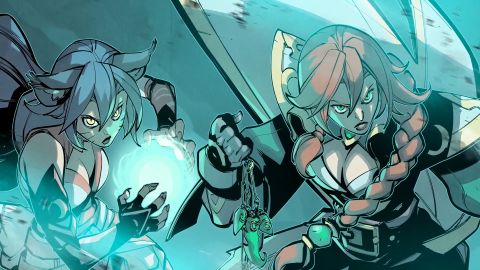Our Verdict
Ruined King’s innovative battle system is the highlight of an attractive but unexciting RPG.
PC Gamer's got your back
What is it? A League of Legends RPG from the team behind Battle Chasers and Darksiders.
Expect to pay $30/£25
Developer Airship Syndicate
Publisher Riot Forge
Reviewed on Intel Core i7-10750H, 16GB RAM, GeForce RTX 2060
Multiplayer? No
Link: Official site
Ruined King may seem familiar if you follow fantasy RPGs. Not because it’s a League of Legends spin-off—I’ll get to that in a moment—but because it draws heavily from developer Airship Syndicate’s Battle Chasers: Nightwar. Ruined King, too, is an isometric RPG with a turn-based battle system and the unmistakable artwork of Joe Madureira. Ruined King, too, has a fishing minigame and vaguely Zelda-ish dungeons. If you’ve played Battle Chasers, you’ll be right at home. Those coming to this from League of Legends may require a more detailed explanation.
Essentially, a few of the LoL champs—Miss Fortune, Illaoi, Braum and a handful of others—have teamed up to save the city of Bilgewater from your standard Deadly Fantasy Mist: the same mist that has consumed the nearby Shadow Isles (nee Blessed Isles). Each happens to be in Bilgewater on unrelated business, before fate conspires to bring the gang together. It’s all to do with former Bilgewater tyrant Gangplank—he’s another LoL champion, by the way—who has murdery history with Miss Fortune, and romantic history with Illaoi, the Kraken Priestess.
There’s not much more to Ruined King’s story than that. It’s a straightforward fantasy RPG, with a setting that’s barely touched on, and with characters moulded firmly on archetypes. Sarah Fortune is the fiery, headstrong pirate captain, Braum is the lovable lump of muscle, Yasuo the disgraced samurai seeking redemption. Illaoi is more notable, being a muscly priestess who batters foes with a massive golden idol. Still, you’ve seen versions of most of these characters before, in other RPGs or fantasy fiction.
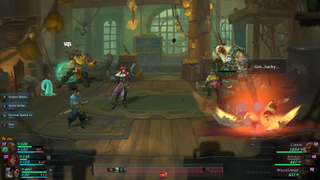
Not that that’s necessarily a criticism—it’s what you do with the characters that counts. And the cast of Ruined King, on the whole, is an entertaining bunch. They’re so cartoonish and larger than life that I feel I knew them already, despite having no knowledge of the game this has spun off from. That’s partly because they’re based on archetypes, but also because they’re so vividly realised, coming to life during the snappy party banter and—in particular—the juicy, turn-based combat.
I’ll bang on about that in a minute, but on a basic level it’s just glorious to watch, as the champs and villains duke it out in side-on, Final Fantasy-style battles. As in Battle Chasers, the animation here is fluid and expressive, whether it’s a basic attack, a nasty chomp from one of the giant bosses, or one of the flashy limit breaks each character soon gains access to. If the story is lean—wasting little time on trifling world-building or character development—then we can learn about our heroes by watching Sarah Fortune juggle her flintlock pistols, or Illaoi heave her idol like a burdensome bowling ball.
Particularly impressive are the boss animations, which force the camera to zoom way out to accommodate them. With their respawning minions and very specific battle conditions, they’re the enemies that make the most of Ruined King’s complicated battle system: a tangle of buffs and debuffs, synergies, and timeline management.
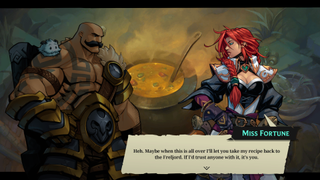
JRPG fans will be familiar with games that use a combat timeline—for example, Final Fantasy X, where you can see the order that everyone will go in combat. Ruined King builds on the concept by turning the timeline into a Lane, a term borrowed from LoL proper that makes the whole thing more confusing than it should be.
Particularly impressive are the boss animations, which force the camera to zoom way out to accommodate them
The icons in the Lane (shown at the bottom of the screen) are so small and indistinct, the menu so unintuitive that it took me a while to grok the system, which is essentially a way to shunt combatants back and forth along the timeline. Say you want your pal Yasuo to act before that pirate jerk—just use an ability that pushes the enemy back along the Lane. Abilities have a wind-up time, so might not activate immediately. The enemy may kill your wounded fighter before your heal spell finally goes off.
If that all sounds perfectly reasonable, that’s because I’ve only told the half of it. There are also environmental Wildcard effects that positively, or negatively, affect each battle. These can come from exterior sources—say, a sniper shooting as you explore a dungeon – but the game will randomly assign effects, including poison and healing, too. Wildcards are eventually activated when someone lands in the box situated on the timeline, giving further reason to shunt participants back and forth.
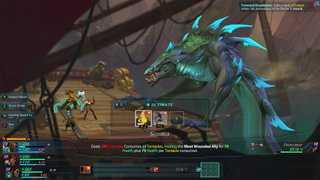
The Lane system is innovative, adding a few more layers of complexity to an already robust battle system. I just wish it hadn’t been implemented in such a fiddly way.
You will need to put your all into combat, as Ruined King isn’t keen on the sort of mindless filler battles common to the genre and so weaker enemies will literally flee from you during exploration. That’s great, in a way—what’s the point in fighting a one-sided battle?—but the relentless pace can make the fights feel quite exhausting.
Combat is clearly the heart of the game, but a compact city sits around it, housing side quests, bounty hunts, and even a spot of mildly diverting fishing. You’ll spend half the game in the menu, of course, crafting enchantments and toggling character upgrades. Everything you’d expect from a turn-based RPG is dutifully and slickly presented here.
It’s just not very exciting. There is little here that surprises. Ultimately, a lot of the game just feels like content, with a League of Legends veneer daubed over the top.
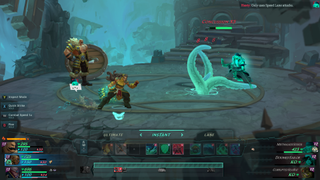
Everything you’d expect from a turn-based RPG is dutifully and slickly presented here. It’s just not very exciting
As for why the story didn’t grip me, it didn’t give me time to care—about the characters, or about the fate of their world. This is a CliffsNotes take on the RPG: excitable and lightning-paced, but where it feels like it starts about halfway through the adventure.
Flashbacks fill in some of the gaps, but not enough to make me invested in the world. I suspect you’ll get much more out of Ruined King if you’re already on-board with the characters and setting of League of Legends.
Ruined King’s innovative battle system is the highlight of an attractive but unexciting RPG.
Tom loves exploring in games, whether it’s going the wrong way in a platformer or burgling an apartment in Deus Ex. His favourite game worlds—Stalker, Dark Souls, Thief—have an atmosphere you could wallop with a blackjack. He enjoys horror, adventure, puzzle games and RPGs, and played the Japanese version of Final Fantasy VIII with a translated script he printed off from the internet. Tom has been writing about free games for PC Gamer since 2012. If he were packing for a desert island, he’d take his giant Columbo boxset and a laptop stuffed with PuzzleScript games.
